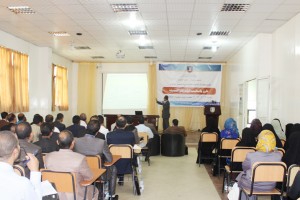Modern Teaching methods Workshop
Saturday, 13 September 2014
A workshop on the modern teaching methods has been organized by Faculty of Medical Sciences. In the opening speech, Dr. Saleh Bahaj, a counselor to the Ministry of Higher Education, talked about the importance of the integration of modern teaching methods with updated and equivalent curricula on the one hand and highly qualified and talented faculty on the other for raising the students’ professional standards. In addition, the latest technological methods should be introduced into the higher education to cope with the problems arising over the last ten years, namely the weak outputs of the private and public universities.
Emphasizing the significance of the workshop, Dr. Abdulkareem Alzumor, Dean of Faculty of Medical Sciences, referred to four essential factors on which the educational quality is based: student, teacher, educational environment, and curriculum. He pointed out that FMS set up last month a workshop on the syllabus description the proof of which is now under review and would be forwarded for final approval. He explained how such an activity is supposed to raise the quality of the faculty’s performance and implement the syllabus as well. He confirmed that the university is keen to achieve such educational cornerstones by conducting consecutive workshops.
Thereafter, the first session entitled “Investigative Learning” began with a lecture by Prof. Mahyoub Ana’m, a professor at Department of Curriculum and Teaching Methods, Faculty of Education, Sana’a University. He defined the Investigative Learning and talked about its features, steps of application, and the role played by both teacher and student. He pointed out how essential to make out of the student a key pillar in the investigative process of learning and knowledge improvement so that they can come to terms with the modern methods of learning.
In the second session, Prof. Saleh Bahaj presented a paper on the preparation of multiple-choice questions (MCQ) and their importance for the test evaluation process according to the modern concept of curriculum.
The workshop concluded with handing the syllabus booklet over to the faculty who held thereafter an in-group brainstorming session to sum up and draft the outcomes of the present as well as earlier workshops and to envision the way they can be practically implemented in the form of an academic-year plan.
Participants in the workshop included Dr. Ahmed Saif, CBT, Prof. Said Alghalibi, the Rector, and a large number of faculty members.
Search
News

رئيس جامعة الناصر الاستاذ الدكتور عبدالله حسين طاهش يقوم بزيارة تفقدية للجان والقاعات الامتحانية الخاصة بكلية الهندسة وعلوم الحاسوب الاثنين 24 فبراير 2025
قام رئيس الجامعة الاستاذ الدكتور عبدالله حسين ط...
جامعة الناصر تنظم ورشة حول التهيئة الرمضانية لمنتسبيها
نظمت جامعة الناصر صباح اليوم الأثنين 25 شعبان 1...
اختتام المؤتمر العلمي الأول للجامعات اليمنية في صنعاء
اختتم اليوم في العاصمة صنعاء، أعمال المؤتمر الع...
لليوم الثاني على التوالي، استمرار أعمال ونقاشات المؤتمر العلمي الأول للجامعات اليمنية.
تستمر في العاصمة صنعاء لليوم الثاني على التوالي...
بمشاركة جامعة الناصر وبحضور رسمي رفيع انطلاق المؤتمر العلمي الأول في صنعاء
صنعاء 20 شعبان 1446 هجرية الموافق 18 فبراير 202...




